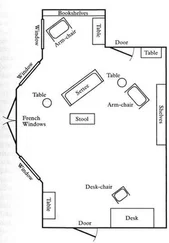Her next set of business would be to inscribe the place cards; years of experience had taught her to wait until now to get started on them, because of the real possibility of last-minute changes to the guest list. Usually it wasn’t a question of gaining new guests, as with the de Louriacs, but losing one. Numbers had then to be swiftly made up — most often with someone “below the salt,” as they called a guest recruited from amongst the embassy personnel, typically one of the first counselors, referring to where protocol would put them around the table — and the seating arrangement rapidly reconfigured to adjust for the difference in clout between the person who dropped out and the person who’d been added. And all the above meant that if the place cards had already been done up, some would need to be discarded and new ones written, a needless waste of both card stock and effort. Despite what most people seemed to think and newspapers liked to print, “thrift” was a byword for diplomatic personnel and their spouses, both regarding time and materials, even as they spent hours of each year entertaining lavishly. One was just not to show it.
There was a delicate rhythm to the whole thing. Living within the diplomatic world wasn’t just a matter of smiling, shaking hands, and wearing attractive clothing. That’s what most outsiders didn’t realize, and that it was possible to take pride in the skill it required, even when it came to something as trivial as knowing how and when to do the place cards. A few years ago there’d been a big stir in the British papers over the revelation that the embassy in Paris spent more than any other British embassy in the world. But did they have any idea how difficult it had become to keep the whole thing going? With the emergence of instant global communications, some pundits had even begun to question the modern-day relevance of diplomats. A clerk was all that was required to authorize passports and sign birth certificates, the argument went, and individual experts could be sent here and there, as needed. Clare thought these were the opinions of people who never traveled.
If anything, today’s world required on-site national representatives more than ever. She had seen firsthand how difficult relations had become with the French for Edward and his colleagues since Britain had joined the U.S. in invading Iraq. The man at the tabac once told her to her face he believed the U.S. was asking for more 9/11s to occur; obviously, the politicians he voted into office weren’t going to be the ones eager to make deals with Americans or their staunch ally, the British. Captains of industry had to be constantly reminded, too, why doing business with the U.S. or U.K. was still in their interest. And these same dynamics were true in countless permutations around the globe, involving countless other combinations of countries. There were layers of ill will out there, and it took ceaseless effort within the diplomatic sphere to keep the machinery of détente from collapsing. Dinner after dinner, lunches and breakfasts, receptions, conferences, workshops, one-on-one meetings; Edward was always busy. Meanwhile, trouble percolated as pervasively as global power was restructured: between India and Pakistan, between Pakistan and Afghanistan, between North Korea and everywhere. There was even talk that new splinter groups of the I.R.A. might rise up against the Good Friday agreement.
The elevator was already waiting on the ground floor, and she stepped into it, swinging the door shut after her. She pressed the button for her floor. And if some radical elements began taking up arms again for the union of Northern Ireland with the rest of Ireland? Would she in some way still be implicated? She leaned against the elevator cage. At least her guilt remained her own; surely no one in Dublin could recognize her. Niall was dead, and she’d given her real name to no one at the hotel. Only the one guy had seen what she was carrying. Was there any chance in a million she could run into either him or the desk clerk anyhow? Or that if one of them saw her photo in a magazine or newspaper, wife to the new ambassador to Ireland, he would recognize her? She looked utterly different than she had then — a middle-aged woman now, well-groomed and confident, transformed by the mantle of respectability and societal stature. Besides, even if one of them did claim to recognize her, she could deny it; airlines didn’t keep records that long of their passenger lists. There was nothing to disprove her claim she’d never been to Dublin.
The elevator rose so slowly, so noisily. She resisted pressing the button for their floor again; it wouldn’t make the old cage rise more quickly. Instead, she adjusted her scarf and sweater. Had she remembered everything for the dinner? But of course, she had. There’d been so many distractions already this morning, and here she’d missed calling Barrow. Still, she was efficient. She could lay claim to that. She took care of things.
“Whenever I think of you, Mom,” Peter had said while home from school over Christmas, “I think of you in beige cashmere, leaning over the dinner table, refolding the napkins while Amélie’s in another room, not looking.”
She hadn’t known whether to be pleased or insulted. She did take a certain pride in the way she’d learned to marry tact and precision.
“Not folding the napkins, dumb shit,” Jamie had said. “Sitting behind the big desk in the study, writing something, making a list or something.”
They were in the car, on the way to a party. Edward had craned his neck around from where he sat beside the driver in the front seat. “It’s not necessary to address your brother like that.” Tiny drops of drizzle competed with the wipers on the windshield behind him.
“And, anyway, Jamie, who are you to say how I remember Mom?” Peter had objected, and the whole question of how Clare was to be remembered was forgotten, except by Clare, who’d since returned to it in private from time to time when she thought about her children and how far away from her they were now. Somehow she’d been unprepared for the inevitable separation that maturation had wrought between them; their healthy arrival into the world had filled her with such astonishment that she hadn’t been able to bring herself to think of them as someday moving on. As expats you were on a magic carpet, you and your spouse and children, floating through the world together, unable to get off individually, not quite of the world around you. Clare sometimes felt she’d leaned on her children, when they were still living at home, as much as they had on her. She’d needed them, anchors in the floating world. Just as they’d needed her to provide a wharf, a common ground, a pillar.
“Your mum is like that lovely column over there, boys, don’t you think? Tall, cool, white, smooth, and wonderfully classic,” Edward had said during a visit to the Acropolis seven years ago. He’d said it with a straight face, but to this day she asked herself: Edward had a sly sense of humor, but had he really once compared her to a caryatid on the Erechtheum, holding up the firmaments of the British Foreign Service? The caryatids were voluptuous, and her chest barely offered cleavage enough to console dinner-party décolletage, much less support the workings of the Queen of England. So many things she was beginning to forget, or at least question her memory of. Most of all she seemed to keep forgetting her sons had left home. She sometimes caught herself up short, rushing back from a reception to check they were safely in bed, with the realization that this was something she couldn’t know about them, might never know about them again on a regular basis, their beds being from now on distant. If only people could choose what to forget and remember; how curious that we often remember what we wish we could forget, and forget what we seek to remember.
Читать дальше












